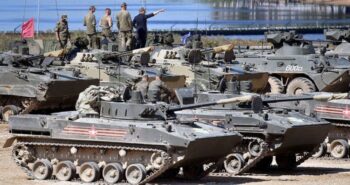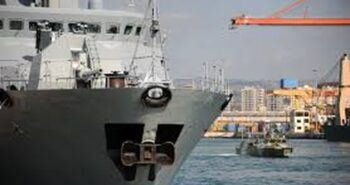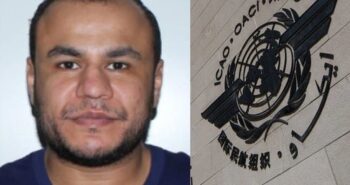Libya’s Second War of Post-Qadhafi Succession
By Jason Pack
 In early April 2019, General Khalifa Haftar instructed the Libyan National Army (LNA) to take Tripoli by force, initiating Libya’s Second War of Post-Qadhafi Succession.
In early April 2019, General Khalifa Haftar instructed the Libyan National Army (LNA) to take Tripoli by force, initiating Libya’s Second War of Post-Qadhafi Succession.
PART THREE
The Main Challenges to LNA National Dominance
First Challenge: Tripoli is not Derna
In Tripoli, the militia opponents the LNA faces are far greater in number than they were in Derna. They are also much better equipped (as we will discuss in greater detail later in this paper).
Tripoli is also a much larger city with many narrow streets and historic neighbourhoods, which would undoubtedly result in fierce house-to-house fighting should the battle ever reach the city centre. Reports suggest that the LNA forces are aware of this and have adapted their tactical approach accordingly.
Their supposed “Tripoli-tactic” is to lure anti-LNA forces into areas on the fringe of the city – such as the non-functional Tripoli International Airport (TIA) – by temporarily capturing the location, withdrawing hours later following a symbolic skirmish.
Then, allowing opposition forces to move in, at which point they respond with a counter attack or airstrike – then rinse and repeat.
It is unclear if this cat and mouse game by the LNA largely explains the fluidity of control of locations on the ground – TIA, Yarmouk Barracks and the Sawani district changed hands on a daily basis throughout most of April.
Their reliance on the “Tripoli-tactic” indicates that LNA units cannot capture fortified choke-points against a determined opposition defending the neighbourhoods in which they live.
Moreover, the LNA is heavily dependent on keeping its extended supply lines open and winning over support from more local groups in and around Tripoli to sustain its operations.
Given ongoing GNA airstrikes against LNA supply routes in the Jufra area, the stability of these lines is in doubt. The LNA also seems to have undermined a lot of its local relationships as a result of its advance on Tripoli, but it may be able to coerce or convince individual groups to strike deals with it, especially if the conflict drags on.
Finally, the LNA would lose a great deal of legitimacy among its supporters and within the LNA itself if it admits defeat and withdraws without good reason.
So even though it seems unlikely that the LNA could win this conflict without significant external intervention – unlikely to be forthcoming in the immediate term, but not impossible as it could receive air support from Egypt or the UAE and special forces/reconnaissance support from either Russia or France – the LNA may still opt to pursue the conflict to the bitter end even in the absence of profound external support.
Viewed from the sidelines, the LNA’s continuation of its Tripoli campaign into May appears a classic example of the sunk cost fallacy.
Second Challenge: LNA’s Purse Strings
But the LNA also has another big problem: money.
Eastern Libya and the LNA are suffering from a liquidity crisis and urgently need a cash injection. The LNA receives funding from the eastern-based commercial banking sector, the state institutions of the parallel HoR-affiliated government, and likely from outside backers.
Correspondingly, LNA troops receive wages indirectly through the Tripoli-based Central Bank of Libya (CBL) and budgetary allocations from eastern-based institutions, such as the Interim Abdullah al-Thinni Government and the eastern Central Bank of Libya both based in al-Bayda.
Recent reports indicate that the LNA is even undertaking business enterprises such as selling scrap metal to supplement its financing. Rather than conceived as forms of illicit economic activity, Haftar likely looks eastward across his border to Egypt and sees these forms of financial generation as part and parcel of army-led state building.
It has been suggested that the LNA also engages in highly profitable real estate transactions and ‘owns’ or has appropriated a significant portion of Cyrenaica’s most valuable land.
All of this has direct parallels to the Egyptian Army, which is said to control more than 20% of Egypt’s GNP and much of its super-prime commercial real estate.
Yet these revenue streams are still not enough.
When the LNA has expanded its territorial ambit with minimal fighting – such as over the oil crescent in September 2016 or over the Fezzan in February 2019 – it has done so by vastly extending its patronage network.
While its salary and operations budget has vastly increased, the LNA’s control over Libya’s oil fields and ports has not translated into increased revenues given that receivables are all directly accepted by the CBL.
Only the National Oil Corporation (NOC) based in Tripoli can sell Libya’s oil – and only the CBL in Tripoli can collect payment for it. As a result, Libya’s oil wealth essentially passes through a central spigot in Tripoli before it is distributed outward in the form of subsidies, salaries and Letters of Credit.
Consequently, access to Libya’s fiscal resources is only achieved through the control of Tripoli. Hence, if the LNA gains control of Tripoli, it could presumably force Tripoli-based financial institutions to grant itself access to the money it desperately needs.
Recently, reports that the Tripoli-based CBL has restricted access to Letters of Credit for three eastern-based commercial banks (Wahda, Commerce and Development Bank and Ijmaa al-Arabi Bank) will make life even more difficult for the LNA and its patronage networks.
The last time the LNA and the parallel Eastern institutions were facing a liquidity crisis in 2016-2017, they received from Russia over 4 Billion counterfeit dinars.
This contraband currency was honoured throughout Libya, even though it was distinguishable from official dinars which are printed in England. The fake dinars bailed out the profligacies of the East and caused the dinar to lose value in the black market throughout Libya.
Anonymous Western diplomats have told the author that to deal with the LNA’s current liquidity crunch 1.9 billion in Russian printed dinars are said to be coming in this year for the LNA’s and the Eastern Institutions’ discretionary use. This could tip the balance of the financial dimension of the fighting in unknown and dangerous ways.
Given the destabilizing effects of these dinars, the GNA could in advance declare any Russian printed currency null and void. Similarly, the Central Bank could, after a period of time, refuse to accept it.
In short, the longer the fighting goes on, the more the LNA’s expenditure will likely mount. The LNA may, therefore, experience an acute balance of payment crisis over the next few months. This fact may actually hold the key to halting the fighting.
Should international policymakers wish to do so, they could facilitate this payment crisis by using sanctions to; (1) block financial transfers to the LNA from its Gulfi and Russian allies as well as injection of counterfeit Russian-printed hard currency and (2) block the Eastern branch of the CBL and the Eastern commercial banks access to foreign currency inflows.
If implemented coherently by a united front of Western actors, these steps (even in the face of a Russian UN Veto) would curtail the LNA’s access to funds, likely bringing it to its knees in a short period of months.
Third Challenge: Overstretch
Ibrahim Jadhran, the revolutionary militia commander and former head of the eastern branch of the PFG, attacked the oil crescent during the LNA’s siege of Derna.
This fact illustrated that the LNA lacks the capabilities, manpower and internal organisation to maintain control over the whole region it occupies while fighting a prolonged battle elsewhere.
This is a key point.
The LNA has efficient patrolling units, relatively well-trained special forces units, and experienced siege units, yet all of these exist in limited numbers, and can only be deployed in certain areas at particular times.
As such, given Libya’s vast geography and myriad armed challengers, the LNA’s recent expansion has made it permanently overstretched, threatening its hold over any particular region or city at any given time.
One might think as the LNA expanded it would have acquired or integrated more core troops. This is not necessarily the case.
The number of core troops and officers it can raise from the appropriate tribes with relevant battle experience or specialised credentials is likely mostly already maxed out. Yet, there are counterexamples of former Qadhafi era officers or Qadhadhifa and Magraha tribesmen who have sat out the post-2011 wars for post-Qadhafi succession remerging in April 2019 to join the LNA, but these limited examples serve to prove the rule.
Unless the LNA wants to rely more on mercenaries and Emirati, Russian, or French advisors, its capacities and size are relatively static.
Hence, the phenomenon of overstretch is a fundamental property of the LNA as currently constructed.
For example, in May 2018, Ibrahim Jadhran launched an assault on oil facilities in the Oil Crescent region leading to significant damage and loss of hundreds of millions in national oil revenue. Jadhran was able to briefly retake the Oil Crescent – partially because the LNA’s forces were bogged down in Derna and partially because the region is sparsely populated and he enjoys vestigial tribal support from that area.
In other words, the LNA faces the constant threat of new challengers, even in their core areas of control, emerging anytime they mobilise their limited forces for campaigns elsewhere in the country.
Fourth Challenge: Timing
As explained in the second challenge, the financial crunch may have, in part, dictated the timing of the current assault on Tripoli.
Another factor was likely the timetable of the international political dialogue process. The LNA’s campaign on Tripoli commenced less than two weeks before the UN’s initial dates for the National Conference, then slated for 14-16 April in Ghadames.
As a result, it has been assumed by many analysts that the LNA’s mobilisation of forces and increased posturing was a tactic to intimidate or coerce groups in the western region into striking deals with the LNA and strengthening its hand during the upcoming conference, rather than as a precursor to a full offensive.
Giving credence to this, only a week before the operation, Haftar told a crowd in eastern Libya that there would be a unified government in Tripoli very soon.
Many analysts, this author unfortunately included, felt that once the UN set concrete dates for the frequently postponed conference, that would make it unlikely for any militants to upset the apple cart for fear of being uninvited and then losing influence in any post-conference power-sharing deal.
We also assumed that the conference would have to go ahead no matter what fighting was unleashed or the credibility of the UN would be irrevocably compromised.
Surprisingly, Haftar’s actions appear, in retrospect, to turn that logic on its head. By using military action to derail the conference and to create new facts on the ground, Haftar’s actions have nullified the potential changes to the status quo and the best-laid plans of the international community.
Haftar has proven himself the ultimate spoiler.
In March 2019, the GNA Prime Minister Fayez al-Serraj and Haftar met in Abu Dhabi under the auspices of the UN for what was pegged as the beginnings of a unity government and power-sharing arrangement between the eastern and western factions which would be bolstered by a new electoral roadmap and ‘ratified’ by the Libyan people at the UN’s National Conference.
Whatever the precise details reached in Abu Dhabi, any such power-sharing agreement would almost certainly force Haftar to accept that he could only ever become the head of the Libyan armed forces or a similarly high-ranking position, under civilian oversight.
As a result, the understandings likely formally prevented him from achieving his not-so-secret ambition of becoming the ‘supreme commander’ – i.e. with no elected officials to answer to. This might explain his decision to derail the UN process.
Fifth Challenge: The War Economy Promotes the Balance of Power
The ‘spoiling’ behaviour engaged in by the LNA’s Tripoli offensive is merely another iteration of larger patterns at play with other armed factions in Libya.
All armed groups in Libya benefit from the ‘war economy.’ It stands to reason that they then allow the current balance of power to be perpetuated as it contains the structural and institutional arrangements which sustain the war economy.
Therefore, with few exceptions, the main objective of the majority of Libyan armed groups is to protect their access to money-making opportunities by maintaining their current status and positions.
Haftar appears to have felt the National Conference could threaten the LNA’s preferential access to certain resources and upset the balance of power as he perceived it.
Conversely in Tripoli, when the balance of local power is threatened, the dominant cartel of militias rally around each other to evict whoever challenged the status quo. This is a deep seated Arab tribal behaviour, akin to the oft-quoted Bedouin proverb, “My brother and I against my cousin; my cousin, my brother and I against the outsider.”
This, plus the financial dimension of their control, is why Wolfram Lacher’s characterization of the Tripoli militias as “a cartel” is particular apt.
The Tripoli cartel has profited from preferential access to subsidised products, smuggling opportunities, and the ability to exert political pressure on the GNA, with which the majority of Tripoli’s militias are nominally affiliated, even though they operate outside of legitimate civilian controls.
Indeed, the militias aligned to the GNA do not directly follow its directives, and in many cases actively work to undermine the establishment of coherent security command-and-control structures.
As shown throughout this paper, all major military actors in Libya can act as spoilers – especially when the rudiments of the war economy, from which they all benefit, are threatened.
Should the international community wish to halt the fighting, it should undertake steps to curtail the flow of salaries, subsidies, and smuggling opportunities to the militias.
Given the financial underpinnings of the conflict, the remainder of this paper seeks to explore the balance of power in Tripoli and to demonstrate that all actors, even paradoxically the LNA, have an interest in seeing the current balance of power and financial arrangement is maintained.
***
Jason Pack is the President of Libya-Analysis LLC, a consultancy organisation specializing in evidence-based analysis, forecasting and stakeholder mapping of Libya.
__________
Italian Institute for International political Studies




